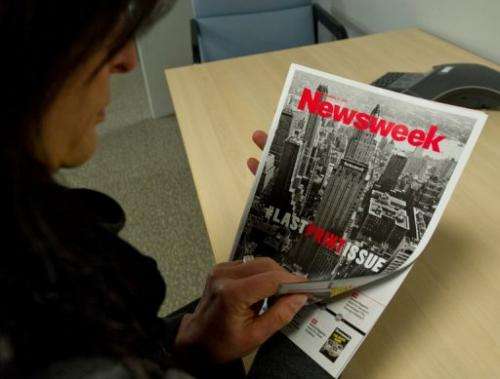This December 24, 2012 photo shows a woman perusing the final print edition of Newsweek in Washington, DC. The operator of the erstwhile news magazine Newsweek, which became a solely digital publication last year after 80 years in print, officially became "NewsBeast" on Friday, its parent company said.
The operator of the erstwhile news magazine Newsweek, which became a solely digital publication last year after 80 years in print, officially became "NewsBeast" on Friday, its parent company said.
The corporate rebranding appeared to leave unchanged the separate online brands of Newsweek and The Daily Beast, which merged in 2010, with the website continuing to bear both names, initially at least.
Newsweek editor Tina Brown, alongside unit chief executive Baba Shetty, told a staff meeting that the Newsweek Daily Beast Company will henceforth be known as NewsBeast, said Justine Sacco, a spokeswoman for corporate parent IAC.
An Instagram photograph showed Brown and Shetty with a caption describing "our new chapter—and company name." The two were pictured behind a logo reading "News_Beast."
It was unclear if the change would be visible to readers, however, as the website newsbeast.com directs people to a Greek-language news site.
The change to NewsBeast, which had been an informal moniker for the news organization, prompted a variety of comments from media watchers.
Adam Pasick, editor of New York Magazine, said in a tweet: "Should have gone with Daily Week... Someone should tell Tina Brown that there is already a Newsbeast."
Jeff Jarvis, a City University of New York journalism professor and blogger, said in a very short Twitter comment: "Really?"
But MediaBistro's Chris O'Shea wrote that "We imagine Brown and Shetty decided to change to NewsBeast because it sounds cool."
And Twitter user Chris Lehmann wrote: "Tina Brown's official embrace of 'NewsBeast' confirms my theory that the project was the result of a radioactive accident off Chelsea Pier."
The final Newsweek magazine hit newsstands in December featuring an ironic hashtag as a symbol of its Twitter-era transition to an all-digital format.
The second-largest news weekly magazine in the United States had been grappling with a steep drop in print advertising revenue, steadily declining circulation and the migration of readers to free news online.
(c) 2013 AFP























